
Arquivos Brasileiros de Cardiologia
Scope & Guideline
Unveiling new horizons in cardiology through open access.
Introduction
Aims and Scopes
- Cardiovascular Disease Management:
Research addressing the prevention, diagnosis, and treatment of cardiovascular diseases, including heart failure, coronary artery disease, and arrhythmias. - Innovative Diagnostic Techniques:
Papers exploring advancements in diagnostic modalities such as echocardiography, cardiac magnetic resonance imaging, and telecardiology. - Epidemiological Studies:
Publications focusing on the epidemiology of cardiovascular diseases within Brazilian populations, highlighting risk factors, health disparities, and outcomes. - Therapeutic Interventions:
Studies on pharmacological and non-pharmacological interventions, including drug therapies, surgical techniques, and lifestyle modifications. - Impact of Comorbidities:
Investigations into the interactions between cardiovascular diseases and other conditions such as diabetes, obesity, and infectious diseases like COVID-19. - Health Policy and Guidelines:
Contributions that discuss the implications of health policies, clinical guidelines, and public health initiatives on cardiovascular care in Brazil.
Trending and Emerging
- Telecardiology and Remote Monitoring:
An increasing number of studies focus on telemedicine, particularly in the context of the COVID-19 pandemic, highlighting its importance in managing cardiovascular patients remotely. - Artificial Intelligence and Machine Learning:
Research integrating AI and machine learning into cardiovascular diagnostics and treatment planning is on the rise, showcasing innovative solutions for improving patient outcomes. - Psychosocial Aspects of Cardiovascular Health:
Emerging interest in the psychological and social determinants of cardiovascular health, including the impact of mental health on heart disease. - Personalized Medicine:
A growing emphasis on personalized approaches to treatment, utilizing genetic and biomarker data to tailor cardiovascular interventions to individual patients. - Public Health and Health Disparities:
Increased focus on public health implications and the social determinants of health, particularly how they affect cardiovascular disease outcomes in various populations. - Long-term Outcomes in Post-acute Care:
Research examining long-term outcomes for patients following acute cardiovascular events has gained traction, emphasizing the importance of continuity of care.
Declining or Waning
- Traditional Risk Factors:
Research on traditional cardiovascular risk factors, such as hypertension and hyperlipidemia, appears to be less frequently explored as newer, more complex markers and multi-factorial approaches gain traction. - Invasive Cardiovascular Procedures:
There is a noticeable decline in studies solely focused on invasive procedures, as the field shifts toward minimally invasive techniques and personalized medicine. - Basic Science Research:
While foundational research remains important, there is a decreasing emphasis on basic science studies as the journal increasingly prioritizes clinical applicability and real-world evidence. - Acute Coronary Syndrome (ACS) Management:
Papers specifically centered on the management of ACS have seen a decrease, possibly due to the saturation of existing knowledge and a shift toward broader cardiovascular themes. - Chronic Disease Management:
Research focused on chronic disease management strategies, particularly in older populations, has waned, potentially overshadowed by more immediate public health concerns.
Similar Journals
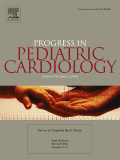
PROGRESS IN PEDIATRIC CARDIOLOGY
Shaping the Future of Pediatric CardiologyPROGRESS IN PEDIATRIC CARDIOLOGY is a notable journal dedicated to advancing research and knowledge in the fields of pediatric cardiology and cardiovascular health in children. Published by Elsevier Ireland Ltd, this journal serves as a vital resource for clinicians, researchers, and healthcare professionals who engage with the complexities of heart diseases affecting pediatric populations. With ISSN 1058-9813 for print and 1558-1519 for online issues, it operates from Ireland and reflects a commitment to disseminating high-quality, peer-reviewed research since its inception in 1992. The journal is ranked in the Q3 category in both cardiology and pediatrics, indicating its relevance in the academic community, despite recent performance metrics showing room for growth within the competitive landscape. Researchers and practitioners can expect to find cutting-edge findings and clinical studies that aim to improve outcomes in pediatric cardiology. While it does not offer Open Access, the breadth of research covers various critical aspects, contributing significantly to the field's ongoing development.

Minerva Cardiology and Angiology
Advancing cardiovascular knowledge for a healthier tomorrow.Minerva Cardiology and Angiology, published by EDIZIONI MINERVA MEDICA, is a prominent journal in the field of cardiology and cardiovascular medicine, with an ISSN of 2724-5683 and E-ISSN of 2724-5772. Established in 2021, this journal aims to foster the dissemination of cutting-edge research, clinical practice guidelines, and innovative methodologies relevant to cardiovascular health. As of 2023, it holds a commendable Q3 quartile rank in its category, reflecting its growing influence within the scientific community. The journal is indexed in Scopus, where it ranks #221 out of 387 in its field, placing it in the 43rd percentile overall. Although it currently does not offer Open Access options, articles published in Minerva Cardiology and Angiology contribute significantly to ongoing discussions and advancements in heart and vascular health. The journal serves as an invaluable resource for researchers, healthcare professionals, and students seeking to stay informed on the latest developments in cardiology.

Journal of Cardiovascular Development and Disease
Unleashing potential through open access to groundbreaking research.Journal of Cardiovascular Development and Disease, an esteemed publication by MDPI, has been a dedicated platform for disseminating cutting-edge research since its inception in 2014. Based in Switzerland, this Open Access journal not only provides unrestricted access to its content but also fosters global collaboration among scholars focusing on cardiovascular health and disease development. With an impressive focus classified as Q1 in Pharmacology, Toxicology and Pharmaceutics for 2023, it attracts a diverse range of interdisciplinary research, supporting advancements in pharmacological applications relevant to cardiac conditions. The journal's ongoing convergence through 2024 highlights its commitment to the evolving landscape of cardiovascular research, making it a vital resource for researchers, professionals, and students alike who are keen to contribute to and learn from significant developments in this critical field.
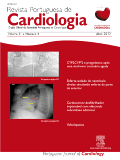
Revista Portuguesa de Cardiologia
Exploring innovative solutions in cardiology since 1970.Revista Portuguesa de Cardiologia, published by Elsevier España SLU, stands as a pivotal resource in the realm of Cardiology and Cardiovascular Medicine. With its origins tracing back to 1970, this journal has cultivated a robust academic presence, achieving a 2023 Q3 ranking in its category, and currently holding a position of #220 out of 387 on the Scopus rankings, placing it within the 43rd percentile of its field. This open access journal, available since 2011, aims to disseminate high-quality research and insights relevant to contemporary cardiovascular issues. Its commitment to accessibility and knowledge exchange enhances its importance for clinicians, researchers, and students alike, fostering a more informed community in the fight against cardiovascular diseases. Operating from its base in Barcelona, Spain, the journal welcomes contributions that further the understanding and treatment of heart conditions, contributing significantly to the advancement of cardiovascular health.

CANADIAN JOURNAL OF CARDIOLOGY
Elevating Standards in Cardiovascular ResearchCanadian Journal of Cardiology (ISSN: 0828-282X, E-ISSN: 1916-7075), published by Elsevier Science Inc, serves as a vital platform for disseminating high-quality research in the dynamic field of cardiology and cardiovascular medicine. Since its inception in 1985, this journal has established itself as a leader in the field, currently holding a prestigious Q1 ranking in Cardiology, indicating its significant impact and contribution to medical science. With a Scopus rank of #50 out of 387 in its category and placing in the 87th percentile, the journal showcases rigorous peer-reviewed articles that advance knowledge and practice in cardiology. Although the journal is not open access, it provides valuable insights and research findings that cater to clinicians, researchers, and students who are committed to improving cardiovascular health. As we approach the convergence of years to 2024, the Canadian Journal of Cardiology continues to strive for excellence, facilitating a discourse vital for both academic and clinical advancements in cardiology.
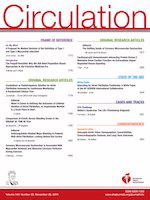
CIRCULATION
Pioneering Research for a Healthier Heart.CIRCULATION is a premier journal in the field of cardiology and cardiovascular medicine, published by Lippincott Williams & Wilkins. With a distinguished history dating back to 1950, the journal has consistently been at the forefront of critical research, showcasing significant advancements and discoveries in cardiovascular health. It holds a remarkable Q1 ranking in both the fields of Cardiology and Physiology (medical) according to the 2023 category quartiles, demonstrating its influential role among the top publications in these disciplines. With an impressive Scopus ranking, placed 3rd out of 387 in Cardiology and 2nd out of 113 in Physiology, CIRCULATION is essential reading for researchers, practitioners, and students passionate about advancing their understanding of heart health and related medical sciences. Although the journal is not open access, it continues to foster scholarly exchange and innovation in cardiovascular research, making it an indispensable resource for quality insights and groundbreaking studies.
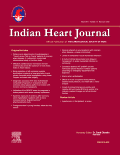
Indian Heart Journal
Elevating Cardiovascular Research to New HeightsIndian Heart Journal, published by Elsevier, is a distinguished peer-reviewed journal dedicated to the field of cardiology and cardiovascular medicine. Founded in 1961, this journal has been a pivotal resource for researchers, healthcare professionals, and students, providing a platform for innovative studies and insights into heart health. The journal transitioned to an Open Access model in 2013, ensuring widespread dissemination of vital research findings to enhance global understanding of cardiovascular diseases. Ranked in the Q3 category for Cardiology and Cardiovascular Medicine in 2023, it holds a reputable position in the medical community, with a Scopus rank of #222 out of 387 journals in the same field, placing it in the 42nd percentile. The Indian Heart Journal strives to foster advances in clinical practice and research while addressing the unique cardiac health challenges faced in India and beyond.
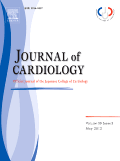
Journal of Cardiology
Exploring the frontiers of heart health and innovation.Journal of Cardiology, published by ELSEVIER, stands as a prominent resource in the field of cardiology and cardiovascular medicine. With a rich history since its inception in 1987, this peer-reviewed journal aims to disseminate cutting-edge research that enhances the understanding and treatment of cardiovascular diseases. Its 2023 ranking places it in the Q2 category within its discipline, reflecting its significance and impact, as evidenced by a Scopus rank of #123 out of 387 journals, positioning it in the 68th percentile of its field. The journal is headquartered in Japan, providing a unique perspective on cardiological advances relevant not only to the Asian continent but also globally. Though it does not currently offer open access, the Journal of Cardiology remains a vital institutional resource for researchers, clinicians, and students seeking to push the boundaries of cardiovascular science and improve patient outcomes.
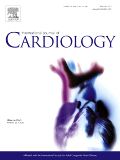
International Journal of Cardiology
Pioneering Discoveries in Cardiovascular MedicineThe International Journal of Cardiology is a premier publication in the field of Cardiology and Cardiovascular Medicine, published by Elsevier Ireland Ltd. With an impressive impact factor and ranked in the top quartile (Q1) of its category, this journal serves as a vital resource for researchers, clinicians, and scholars committed to advancing cardiovascular health. Founded in 1981, the journal has been pivotal in disseminating significant findings, with a wide-ranging scope that includes original research, reviews, and clinical studies aimed at improving patient outcomes and understanding heart diseases. Its robust ranking of #73 out of 387 in Scopus ensures that it remains a leading platform for impactful cardiovascular research. While currently not an open-access publication, the journal's commitment to quality and relevance makes it an essential reference point within an ever-evolving medical landscape. For those engaged in cardiovascular research, the International Journal of Cardiology is not just a journal; it's an indispensable source of knowledge shaping the future of heart health.
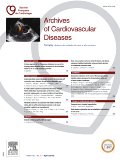
Archives of Cardiovascular Diseases
Advancing cardiovascular health through groundbreaking research.The Archives of Cardiovascular Diseases, published by Elsevier Masson, stands as a leading journal in the field of cardiology and cardiovascular medicine, with an impressive impact factor that underscores its relevance and influence. This esteemed journal, recognized in the Q2 category for both cardiology and miscellaneous medicine, aims to disseminate groundbreaking research, innovative methodologies, and clinical advancements that can shape the future of cardiovascular health. With its diverse array of open access options, researchers and students alike have the ability to engage with high-quality content, ensuring that cutting-edge findings are accessible globally. Since its inception in 2008, the journal has actively contributed to the advancement of knowledge in cardiovascular diseases, fostering collaboration among clinicians, researchers, and educators. Headquartered in Paris, France, Archives of Cardiovascular Diseases remains committed to enhancing our understanding of cardiovascular health and improving patient outcomes worldwide.